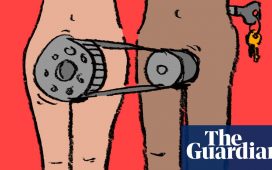I was a 35-year-old virgin when I realized I was addicted to longing. I got off on the high of anticipating sex I knew I wasn’t going to have, and then masochistically wallowed when letdown inevitably followed.
My crushes were the popular guys in high school, the elusive seat-mate on an airplane ride, and the soldiers shipped overseas. I binge-watched When Harry Met Sally and planned weekend trips to far-flung destinations hoping to rekindle an old flame or attract the eye of a romantic interest I’d spent hours stalking on Facebook.
By the time I was a 41-year-old virgin, I found myself living a unique form of purgatory. Longing for a relationship with unavailable men had become a way of protecting myself from the loneliness of being single and the messiness and monotony of being in a long-term relationship. Sexual abstinence amplified the anticipation factor. My friend with anorexia told me she fantasized about elaborate meals but never ate them. I understood. My addiction to longing was never about sex, it was about control.
The fact that I entered the fifth decade of life a virgin puts me in the minority, but idealizing the past and seeking the thrill of anticipation to avoid discomfort is exceedingly common – particularly since the pandemic. If you’ve reached out to an ex during lockdown, you’re far from alone.
Google searches for “Why am I dreaming about my ex?” shot up 2,450% in April 2020 compared with the year before. Online-dating apps have seen a surge of activity during the pandemic. Ashley Madison, the world’s leading married dating site, saw its sign-ups increase from 15,500 members a day to over 17,000 a day at the start of the pandemic. Most members of the site, whose tagline is “Life is short. Have an affair”, say having affairs helps maintain their marriages. Only 1% of members see themselves leaving their spouse. When asked about this, those surveyed say having an affair is either a great distraction, or something to look forward to.
So we can’t help Googling exes and trying to have affairs. In fact, recent research suggests we’re wired for longing – and trying to connect with unavailable current and past lovers is just one way we do it.
For others, anticipation comes not in the form of a virtual stranger but a box on our porch. As the pandemic cut many of us off from in-store shopping, dining and other experiences, US e-commerce sales increased 44% in 2020. There is actually a surprising psychological concept which could explain this splurge: when we feel our lives threatened, we develop new ways to cope. So with routines falling apart and the world uncertain, online shopping provides a way to feel some sense of control.
Mike Miller, an outdoor enthusiast, admits he spent about $4,500 online in the first three months of the pandemic, having turned to impulse-buying for satisfaction when he realized his usual pastimes – travel and experiences – were cut off to him. “I’d look at camping gadgets and sports equipment I knew I wouldn’t wear anytime soon. It would give me a chance to daydream about life returning to some kind of normal,” he explains.
To feel happy, many of us turned to anticipation without guaranteed payoff. People invested time and money surfing travel sites, even booking trips not knowing if and when they’d be able to take them.
Science proves it doesn’t matter if we do. And when it comes to making purchases, psychologists have found we derive more enduring happiness from anticipating experiential purchases (money spent on doing) than material purchases (money spent on having). “Trips don’t just make us happy while we’re on them; they also make us happy when we’re talking to other people about what we’re going to do,” says Amit Kumar, a professor at the University of Texas whowrote a paper on this phenomenon in 2014.
But what is longing – is it bad for us, and if so, is there a way of curtailing the habit?
Why do we long?
Neuroscience suggests our brains are wired to crave what we don’t have. Dopamine (known as the happy hormone) is released not when we get what we want, but when we anticipate getting it. Our brains release more dopamine planning a vacation than taking it. Even thinking about touch you crave can trigger the release of dopamine in the reward system. Once we get what we want, the dopamine fades – and so we crave more. With anticipation being a key stage in happiness, and depression rates in the US tripling last year, it’s no wonder so many people find themselves longing.
Dr Kent Berridge, professor of psychology and neuroscience at the University of Michigan, says powerful emotional experiences and stress – such as those that might ensue after being locked inside for months on end due to a deadly worldwide virus – exacerbate the hyper-reactivity of the dopamine system. In other words, these experiences increase our appetite for wants (food, sex, material objects, drugs) as a way of escaping the discomfort of reality.
What could be so bad about that? Well, our “want” brain circuits have been getting a workout this year, and repetition builds habit.
“Any habit is formed through three elements: a trigger, a behavior and a reward,” says Dr Jud Brewer of Brown University. If anxiety is the trigger, longing distracts us. The excitement is the reward. “The next time we’re anxious, our brain says, ‘This doesn’t feel good. Start longing again,’ and the behavior gets reinforced,” explains Brewer.
What’s wrong with escaping unpleasant feelings?
Ancient philosophy has long argued that happiness is found in the present moment. Science supports this. Incessant daydreaming about the past and future is related to psychological symptoms like depression, anxiety and stress – while thinking about the present reduces those symptoms.
Bingeing on The Crown or scrolling through Zillow listings for hours every night might provide us with a temporary escape, but these habits produce drug-like dopamine highs that elicit more longing and lead to depression and increased anxiety. The high is so strong that almost half of Zillow users surveyed this year said they’d rather search for a dream home than have sex. And the same neuronal pathways are responsible for addictions to both heroin and binge-watching.
The issue, says Brewer, is that we tend to confuse joy and contentment with excitement and anticipation. “If you really look at what excitement feels like, it’s got a restless, driven quality to it. That’s the dopamine urging us to do something, because we’re not satisfied with what’s happening right now,” explains Brewer.
Of course, binge-watching movies, online shopping and daydreaming aren’t inherently bad behaviors. They are a way to find momentary reprieve, to imagine good things to come, without actually being there yet.
But there is such a thing as too much daydreaming. Maladaptive daydreaming (MDD) involves living in fantasy worlds so vivid they interfere with sleep, work and relationships as a means of distracting oneself from our emotions. At its most extreme, a person paces while dreaming, carves out hours of their day to enter their fantasies, forgets to eat and can’t sleep. Daydreamers often enter worlds they created as children trying to cope with great loss or trauma.
One study shows that the lockdown has resulted in heightened levels of MDD. Meanwhile tens of thousands of maladaptive daydreamers have flocked to the MDD Reddit page and Facebook group page for support. Many of the posters would agree with the Three Musketeers writer Alexandre Dumas: “When you compare the sorrows of real life to the pleasures of the imaginary one, you will never want to live again, only to dream forever.”
Nora has been maladaptive daydreaming for 20 years, but neither her husband nor her teenage son know. (She asked me to use a pseudonym for privacy.) “Periods of solitude – like when my husband is deployed – are worse for me,” she wrote to me. Nora started daydreaming when she had a prolonged illness at age 15. During that isolating time, she felt useless and lonely as friends’ visits dwindled. Nora fixated on the Lord of the Rings books for comfort; she revisits them in her daydreams 20 years later. “A story about the smallest person being able to change the world appealed to me. I’m always in the background of my dreams helping,” she wrote.
Is there a good kind of longing?
There is a positive side to longing, says the author Cheryl Strayed, who wrote intimately about longing in her memoir, Wild. About longing for her mother, who passed away 30 years ago, she told me: “Healthy longing, even when you know it can never come true … It feels like nutrition, rather than sucking the life out of you.”
Now, most of the time when she longs for her mom, she says, “I actually feel a sense of wonder. What a beautiful thing that I had the experience of loving someone so much that I will really love them like that for ever. That longing has just come to feel like a gift.”
Can we stop longing?
To change a behavior, we have to get out of our heads and into our bodies. Beyond the thrill (the dopamine hit) we get from anticipating, we must consider the cumulative effect it has on us: the post-dopamine letdown, the emotional energy and time wasted, and the impact on those around us.
Dr Nirit Soffer-Dudek, a consciousness researcher at Ben-Gurion University of the Negev, suggests that psychotherapy for MDD patients should help them be more mindful in the present, less judgmental of themselves, and more aware of what triggers the behavior they want to change. “A lot of people escape to these other realities because they don’t like themselves in real life. Self-acceptance should be a major part of treatment, alongside changing what we can change.”
The key question is: what is the emotion behind the need to crave something, someone, or somewhere other than what you have right now?
Personally, I realized that buried deep in my gut I felt unworthy of love. I felt anxious about failure and guilty about relationships that hadn’t worked out. Longing for the ideal partner in the ideal location at the ideal time kept me distracted from addressing this self-loathing. And, ironically, it meant I sought out men who didn’t or couldn’t love me. During the year of 2019, I broke up with longing when I gave a healthy relationship a chance with a man who loved me.
After three pandemic postponements, I will celebrate my marriage with this man and our daughter this summer in a wedding I’ve longed for for years.













